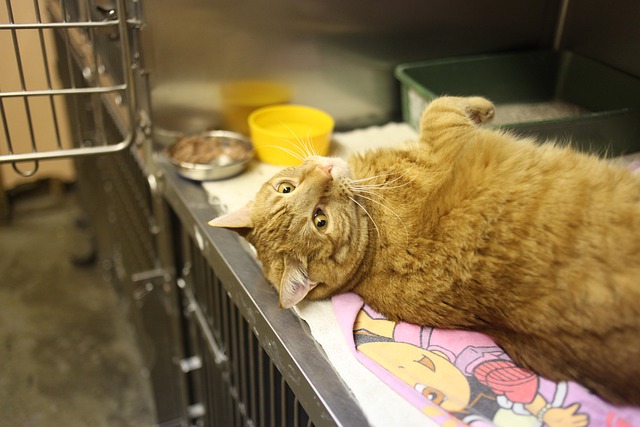- Full AVMA-CVTEA accreditation, allowing graduates to qualify for the VTNE examination.
- Study online, at your own pace, wherever you are.
- Receive ongoing support from our Veterinary Academy Team.
Have no fear if you’re hoping to become a vet technician in Georgia.
The American Veterinary Medical Association (AVMA) has an accredited college in the state that can help you attain that vet degree.
So if you love working with animals and people alike, then you’ll also love working in this coveted career.
Now let’s see what becoming a vet technician in Georgia has in store for you!
Table of Contents
Job Description and Duties of a Vet Technician in Georgia
Vet technicians are the vets’ right-hand men.
You take care of everything the vet might need, with or without their supervision and guidance.
Here are some of your future duties as a vet technician:
- Record keeping
- Cleaning after animals
- Emergency care and first aid
- Handling their bodily fluids or discharge
- Monitoring vitals (pulse, body temperature, etc.)
- Taking x-rays
- Applying medications, fluids, and blood products
- Patient communication
- Administering anesthesia
At times, you may have to assist in euthanasia, however unpleasant it might be.
Majority of vet technicians work in private practice, but you can also find work in the following areas:
- Internal medicine
- Emergency and critical care
- Zoological medicine
- Surgery
- Clinical practice
- Nutrition
- Clinical pathology
- And many more
How to Become One
Georgia has the University of Georgia offering an associate’s degree in vet technology.
As of this writing, the school is the only one in the state that’s accredited by the AVMA.
After you’ve graduated, you’re eligible to take the Veterinary Technician National Examination (VTNE).
It’s a licensure exam you need to pass to work professionally as a vet technician.
Education Required for a Vet Technician in Kansas
Admission requirements vary in each school.
You’ll have to visit their websites for more information about it.
But one thing they have in common is that they require a high school diploma or GED equivalent at a minimum.
Some of them will allow you to take some prerequisite courses while still in high school.
These courses usually cover the basics such as math, biology, chemistry, humanities, etc.
If you haven’t taken them yet, you have to attend them before enrollment.
Meanwhile, others may or may not need you to:
- Take a rabies vaccination
- Write an essay
- Go to an entry interview
- Passing or high scores on tests like SAT, ACT, or COMPASS
Typically, the coursework for the vet technology program is uniform across all schools.
You will learn the following subjects:
- Anatomy
- Physiology
- Biology
- Radiology
- Anesthesia
- Large and small animal medicine
- Pathology
- Practice management
- Veterinary economics
- Exotic animals
- Surgery
- Pharmacology
- Clinical skills
It can take two to three years before you can graduate with an associate’s degree in vet technology.
Tuition and Financial Aid
Most accredited programs in Georgia have tuition rates of around $100 per credit hour.
This includes additional fees like equipment, insurance, lab costs, and uniforms.
Students from outside the state may have to pay tuition two to three times higher than in-state students.
Fortunately, Georgia has reciprocity agreements with some of the neighboring states.
Plus, there are financial aids you can avail of to help lessen the financial burden.
In-state students can reach out to the Georgia Student Finance Commission for financial.
One of their most popular scholarship programs is Helping Outstanding Pupils Educationally (HOPE).
You can also apply for federal aid and scholarship through Free Application for Federal Student Aid.
Here, you’ll find out what types of aid are available and for which you meet the criteria.
Do note that not all schools participate in federal student loan programs.
So be thorough and check the financial aid information twice of the school you’re interested in.
Popular Programs
Get your accredited and budget-friendly associate degree or career diploma entirely online!
Veterinary AssistantVeterinary TechnicianVet Office ManagerDog ObediencePet GroomingSponsored Online Programs.Licensing and Certification
The Georgia State Board of Veterinary Medicine handles the licenses of vet technicians.
To get your professional license, you’ll have to take and pass the VTNE.
It’s an exam regulated by the American Association of Veterinary State Boards.
Only those who graduated from an accredited vet technology program can take the test.
It consists of 150 questions, taking three hours to finish.
Before taking it, you must pay the exam fee of $300.
To keep your license current, you need to complete 10 hours of continuing education every two years.
Five of those hours may be completed online.
Getting a Job in Georgia
With you done with college and earring your license, you can safely start looking for a job in Georgia.
And it really shouldn’t be too difficult.
There’s a growing number of facilities you can work in, and there’s a variety of options for you.
You can choose to work in an animal shelter, vet hospital, clinic, or zoo.
And here are the facilities where you might find your first job in Georgia:
- Veterinary Centers of America – Georgia Branches
- Carrollton Animal Hospital
- Columbia Animal Hospital
- Roswell Animal Hospital
- Greater Savannah Animal Hospital
- Banfield Pet Hospitals located in:
- Macon
- Augusta
- Savannah
- Vetco Wellness Centers and Vaccination Clinics located in:
- Alpharetta Gardens Petco
- Atlanta Petco
- Peachtree City Petco
- Buford Petco
Salaries for Vet Technicians in Georgia
Today, more and more American households adopt pets, making the vet field more valuable.
They are willing to pay more for quality vet care services, resulting in a competitive job market.
Meaning, you as a vet technician have more job prospects offering good paychecks in your options.
Here are the average annual salaries in cities across Georgia:
| Location | Avg. Annual Salary |
|---|---|
| Albany,GA | $33,499 |
| Athens,GA | $35,637 |
| Atlanta,GA | $35,893 |
| Augusta,GA | $33,702 |
| Columbus,GA | $32,925 |
| Macon,GA | $33,851 |
| Marietta,GA | $35,791 |
| Roswell,GA | $35,757 |
| Savannah,GA | $34,067 |
| Valdosta,GA | $32,835 |
Regional Salary in Georgia
| Region | Employed | Avg. Annual Salary | Avg. Hourly Pay | Top 10% Annual Salary | Bottom 10% Annual Salary |
|---|---|---|---|---|---|
| Athens-Clarke County, GA | 80 | $37,440 | $18 | $49,090 | $27,170 |
| Atlanta-Sandy Springs-Roswell, GA | 1,760 | $42,920 | $20.64 | $57,270 | $31,270 |
| Augusta-Richmond County, GA-SC | 100 | $37,930 | $18.23 | $47,660 | $29,760 |
| Columbus, GA-AL | 50 | $32,780 | $15.76 | $42,720 | $26,560 |
| Gainesville, GA | 50 | $39,690 | $19.08 | $61,080 | $29,540 |
| Macon, GA | 40 | $32,480 | $15.62 | $42,930 | $27,730 |
| Rome, GA | 40 | $39,670 | $19.07 | $51,680 | $28,250 |
| Savannah, GA | 110 | $37,650 | $18.1 | $46,150 | $29,110 |
| Valdosta, GA | 40 | $35,660 | $17.15 | $43,750 | $26,380 |
| Warner Robins, GA | 60 | $37,060 | $17.82 | $45,210 | $27,980 |
* Employment conditions in your area may vary.
Final Words
Being a vet technician is quite a challenging career.
As such, you need to be informed and be aware of what this job entails before you make that first decisive step.
Consider the extra hours you’ll give and the physical and emotional toll it’ll have on you.
If you think you can handle these, then we wish you all the best toward success.


